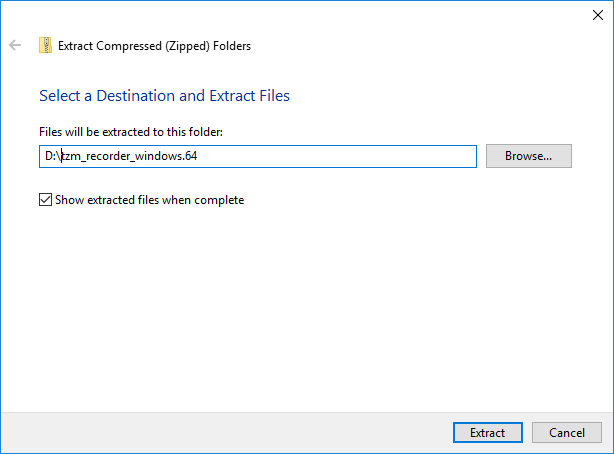Difference between revisions of "Sizer"
(→Recorder to obtain Sizing information) |
(→Using Recorder in Windows) |
||
| Line 40: | Line 40: | ||
|} | |} | ||
| − | == Using Recorder in Windows == | + | == Using Recorder to obtain Sizing information in Windows == |
==='''Step 1'''=== | ==='''Step 1'''=== | ||
| Line 63: | Line 63: | ||
| | | | ||
|} | |} | ||
| − | |||
== Example Sizer Outputs == | == Example Sizer Outputs == | ||
Revision as of 08:41, 23 April 2020
This page outlines the steps needed to running tzm_recorder to obtain figures for sizing an Environment. The tool is either downloaded from a Tranzman Appliance that has been configured for performing Assessments, or can be obtained by sending a request to Tranzman Support
Using Recorder to obtain Sizing information in *nix
Step 1
Once the file has been copied to the backup server, extracted the contents, make sure there is at least 100MB of space in the folder where you extract, this will also be used as the run folder where data capture is staged.
Extract files from the TGZ archive using the tar command.
|
tar xzf tzm_recorder_linux.64.tgz |
If tar doesn't support the "z" option you will need to use "gunzip" first.
|
gunzip tzm_recorder_linux.64.tgz tar xf tzm_recorder_linux.64.tar |
Step 2
Modify access to all files extracted in the newly created tzm_recorder folder.
|
chmod +rx -R tzm_recorder |
Step 3
Run tzm_recorder found in the extracted folder.
|
cd tzm_recorder ./tzm_recorder -sizer |
Using Recorder to obtain Sizing information in Windows
Step 1
Once the file has been copied to the backup server extracted the contents, make sure there is at least 2GB of space in the folder where you extract, this will also be used as the run folder where data capture is staged.
Right click on the zip file to extract.
Step 2
Open a CMD window, and run the tzm_recorder.exe tool
|
D: cd \tzm_recorder_windows.64\tzm_recorder tzm_recorder.exe -sizer |
| Note: The CMD window needs to be run from an account with Administrator rights for it to work properly. |
Example Sizer Outputs
NetBackup
|
------------------------------------------------------------- -- Sizing Information -- ------------------------------------------------------------- Environment Name = nbu-example-srv Backup Product = NBU Backup Product Version = 8.2 Platform = MSWin32 Clustering Technology = Standalone Catalog Size = 1.78TB Catalog Backup Duration = 99981 Protected Data Size = 2.86PB Number of Images / Sets = 245078 Number of Fragments / SubSets = 790218 Largest Image / Set = 3.18TB Largest image file count = 29679145 Average daily images = 7280 Number of Media = NONE Number of Active Clients (in policies) = 756 Number of Clients (with backups) = 6752 Number of Servers under Master Control = 12 Number of Policies / Workloads = 364 Server RAM = 64.00GB Server CPU/Core Count = 36 Backup Data Types = [ 35 0 40 7 24 13 ] New Job / Policy Types = [ 25 35 40 7 17 15 4 0 24 19 13 ] Largest media used capacity = 0.00B Server Roles = [ master server ] Devices = [ AdvancedDisk BasicDisk PureDisk DataDomain ] Encryption = YES Dedupe = YES |
Spectrum Protect / TSM
|
|
Data Protector
|
------------------------------------------------------------- -- Sizing Information -- ------------------------------------------------------------- Environment Name = hpe-example-srv Backup Product = HPE Backup Product Version = 10.30 Platform = linux Clustering Technology = Standalone Server Roles = UNKNOWN Catalog Size = 1.52GB Catalog Backup Duration = UNKNOWN Protected Data Size = 2.17PB Number of Images / Sets = 42003 Number of Fragments / SubSets = 42003 Largest Image / Set = 3.96TB Largest image file count = 44640212 Average daily images = NONE Number of Media = 7329 Largest media used capacity = 33.44TB Number of Active Clients (in policies) = 137 Number of Clients (with backups) = 329 Number of Servers under Master Control = NONE Number of Policies / Workloads = 164 Server RAM = 36GB Server CPU/Core Count = 8 Backup Data Types = [ IDB ORACLE8 WINFS FILESYSTEM E2010 ] New Job / Policy Types = NONE Devices = [ ObjectStore LTO-Ultrium ] Encryption = NO Dedupe = TES |
Commvault
|
|
Backup Exec
|
|
